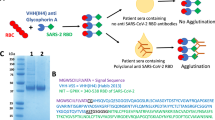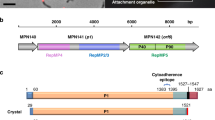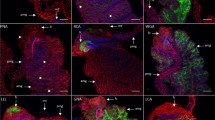Abstract
VIRULENT strains of Acanthamoeba produce cytopathic effects in mammalian tissue cultures1–3, and cause acute meningoencephalitis in laboratory animals after intranasal inoculation1. In humans, Acanthamoeba seem to produce cerebral lesions in defence-weakened individuals4–7. We have begun studies of the cell surface of Acanthamoeba since virulent strains must make direct contact with a host cell before initiation of degenerative changes in mammalian tissue cultures2,3. The sensitivity of avirulent and virulent strains to concanavalin A (con A)-induced agglutination was investigated first as there was no evidence that carbohydrate-containing components were exposed at the cell surface of Acanthamoeba. Our results indicate that both avirulent and virulent Acanthamoeba were sensitive to con A-induced agglutination. In contrast to the results of studies of avirulent and virulent Entamoeba histolytica8, however, the avirulent strain was more sensitive to con A.
This is a preview of subscription content, access via your institution
Access options
Subscribe to this journal
Receive 51 print issues and online access
$199.00 per year
only $3.90 per issue
Buy this article
- Purchase on Springer Link
- Instant access to full article PDF
Prices may be subject to local taxes which are calculated during checkout
Similar content being viewed by others
References
Culbertson, C. G., Ann. Rev. Microbiol., 25, 231–254 (1971).
Chang, R. S., Pan, I., and Rosenau, B. J., J. exp. Med., 124, 1153–1166 (1966).
Dunnebacke, T. H., and Williams, R. C., Proc. natn. Acad. Sci. U.S.A., 57, 1363–1370 (1967).
Chang, S. L., in CRC Critical Rev. Microbiol. (in the press).
Kenney, M., Hlth Lab. Sci., 8, 5–10 (1971).
Robert, V. B., and Rorke, L. B., Ann. int. Med., 79, 174–179 (1973).
Jager, B. V., and Stamm, R. P., Lancet, ii, 1343–1345 (1972).
Martinez-Palomo, A., and Gonzalez-Robles, A., Nature new Biol., 245, 186–187 (1973).
Neff, R. J., In Vitro, 6, 300–308 (1971).
Stevens, A. R., and O'Dell, W. D., J. Parasitol (in the press).
Stevens, A. R., and O'Dell, W. D., Proc. Soc. exp. Biol. Med., 143, 474–478 (1973).
Stobo, J. D., and Rosenthal, A. S., Expl Cell Res., 70, 443–447 (1971).
Inbar, M., and Sachs, L., Expl Cell Res., 32, 124–128 (1973).
Noonan, K., and Burger, M., J. Cell Biol., 59, 134–142 (1973).
Inbar, M., Ben Bassat, H., and Sachs, L., Proc. natn. Acad. Sci. U.S.A., 68, 2748–2751 (1971).
Noonan, K., and Burger, M., J. biol. Chem., 248, 4286–4292 (1973).
Nicolson, G., Nature new Biol., 239, 193–197 (1972).
Author information
Authors and Affiliations
Rights and permissions
About this article
Cite this article
STEVENS, A., KAUFMAN, A. Concanavalin A-induced agglutination of Acanthamoeba. Nature 252, 43–45 (1974). https://doi.org/10.1038/252043a0
Received:
Revised:
Issue Date:
DOI: https://doi.org/10.1038/252043a0
This article is cited by
-
Detection of surface carbohydrates on Pneumocystis carinii by fluorescein-conjugated lectins
Parasitology Research (1987)
-
Selective lectin reactions of two stocks of Leishmania enriettii with differing pathogenicity
Parasitology Research (1987)
-
The influence of concanavalin A and cytochalasin B on pinocytotic activity inAmoeba proteus
Protoplasma (1981)
-
Carbohydrate binding proteins involved in phagocytosis by Acanthamoeba
Nature (1975)
Comments
By submitting a comment you agree to abide by our Terms and Community Guidelines. If you find something abusive or that does not comply with our terms or guidelines please flag it as inappropriate.



